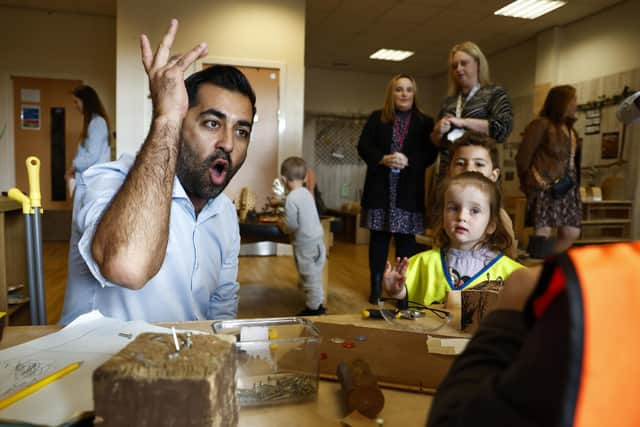Flaws in Humza Yousaf's plan prevent Scotland's free childcare expansion from fulfilling potential
ouldThere is a significant body of evidence that shows that one way to address child poverty is remove the gender barriers which have traditionally made it difficult for mothers to join or re-enter the workforce. In broad terms, the commitment shown by successive SNP administrations at Holyrood has supported this direction of travel.
But there have been plenty of obstacles along the way, and plenty remain. As the Child Poverty Action Group has pointed out, it is not simply a question of providing childcare, but providing the childcare that is appropriate. The system only works if every parent is able to access the childcare they need, when they need it.
Advertisement
Hide AdAdvertisement
Hide AdSo with First Minister Humza Yousaf putting the latest expansion of childcare front and centre of his Government’s commitment to tackle poverty, how is the system working so far? Well, the most recent data indicates there were 92,615 children registered for early lear ning and childcare (ELC) across Scotland as of September last year, down from 96,375 in September 2019. That dip can be explained, in part at least, by oscillating demographic trends. But it also signals the Covid pandemic has resulted in changes to ELC use, with some providers reducing their hours or closing completely.
Which is not to say that some parents are simply not using other forms of childcare to close the gap. Quite the contrary. Last year, a sizable minority of those using the funded ELC provision – around 22 per cent of parents of children aged three to five years – were also using paid-for childcare. This is where the Government tubthumping and reality diverge.
While Mr Yousaf, and before him, Nicola Sturgeon, have shouted from the rooftops about Scotland having expanded ELC to 1,140 hours a year, the truth is that not everyone uses their full entitlement. Or to be more precise, not everyone can. The Government’s own research shows that last year, only 73 per cent of parents with children aged three to five used all their allocated hours.
In some cases, many of those parents didn’t need the full entitlement, or simply didn’t want their children in nursery for so long. But here is the real issue – out of those parents who did not use their full 1,140 hours of funded childcare, almost a quarter (23 per cent) said they could not get the care they wanted at their preferred setting, with the problem especially pronounced among households where both parents worked.
This has been one of the key failings of a system designed to promote choice. Even before the pandemic, the set models of childcare offered by many local authorities, which largely prioritised their own nursery settings above all other providers, proved to be a poor fit with the commitments of many working families. The widespread changes to work practices that have occurred over the past three years have only intensified the need for a framework that offers week-to-week flexibility.


Unless that is achieved, such limited options will impact every family. But as is nearly always the case, it is the poorest and the most vulnerable who stand to lose the most. It might suit middle-class families where the parents are in stable nine-to-five working patterns, but the ELC system must adapt to help those on low incomes with variable hours and zero-hour contracts. Otherwise the likes of women employed in the social care sector, where 12-hour shifts are commonplace, will continue to face the Hobson’s choice of having to give up work or pay for top-up childcare that best meets their needs. More than one in six (62 per cent) of those parents who had paid for childcare last year said they had experienced affordability problems in the previous 12 months.
To Mr Yousaf’s credit, he acknowledged difficulties in his address to Holyrood this week, promising that parents and carers would be afforded “more scope” to manage childcare, with the process being simplified to enable them to “have more control over their childcare choices”. But the devil will be in the details. Close the Gap and One Parent Families Scotland are calling for a universal funded entitlement of 50 hours a week for children aged six months and above that is free at the point of use for all families.
Realising that will require ambition and, more importantly, significant and sustained shifts in provision. Workforce data shows as of June, staff turnover in the private nursery sector stood at 29 per cent. To that end, it was notable Mr Yousaf promised funding for employees across the private, voluntary and independent sector.
Advertisement
Hide AdAdvertisement
Hide AdHe also announced his Government would support efforts to recruit and retain more childminders, with the aim of bringing 1,000 people into the profession by the end of this parliamentary term. This, too, is welcome, but in truth, it is a case of taking one step forward after falling two steps behind.
Since funding was increased for early education and childcare in 2016, the Scottish Childminding Association says its workforce has lost nearly double the number of new recruits mentioned by Mr Yousaf, down from 5,520 in July 2016 to just 3,594 last summer. And it predicts it will continue to fall. Ironically, the push to 1,140 hours a year has been largely to blame for this exodus, given the national drive to recruit nursery staff.
There are a complex set of interrelated factors at play here and, until they are resolved, the Government’s goal of using affordable and accessible childcare to lift families out of poverty while boosting the economy will be difficult to achieve. Mr Yousaf seems to understand what needs to be fixed, but fixing it is another matter altogether.
Comments
Want to join the conversation? Please or to comment on this article.